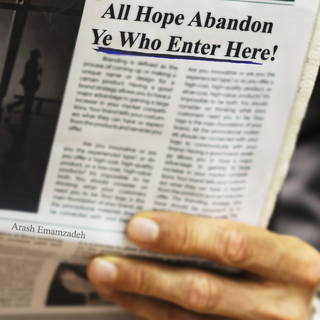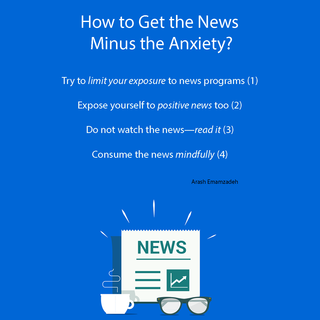Fear
What to Do If the News Has Made You Paralyzed With Fear
Less stress-inducing ways to obtain and digest the news.
Posted March 13, 2020 Reviewed by Jessica Schrader

What makes the news? Rarely is it love, happiness, friendship, healthy habits, charity, or volunteering. Instead, it is often financial problems, people’s unhealthy behaviors, disease, scams, robberies, burglaries, accidents, fires, natural disasters, murder, suicide, rape, racism, discrimination, terror, and war. And these days, it is the news of the coronavirus disease COVID-19 spreading, making people sick, causing economic upheaval, and mass panic. If you have a mental illness, like anxiety, OCD, or PTSD, you might be feeling very anxious these days.
So, how to stay up to date? Here are four suggestions.
1. Try to limit your exposure to news programs.
News programs affect us emotionally. Though men, compared to women, seem to be more hard-wired for attention to (and memory of) negative news,1 news programs can make all of us more anxious, depressed, and more likely to catastrophize personal worries.2
One solution is limiting our exposure to news. How? By making smarter choices—reducing unnecessary exposure to old, irrelevant, disturbing, or graphic content.
For instance, take a moment to consider whether you really need to know the graphic details of how a serial killer killed a dozen people, or need to be informed daily of how many new cases of the coronavirus are suspected in some country you do not plan to visit.
When you do need to learn the details of an event, try to obtain your information from intelligent, objective, focused, and solution-focused sources. Sources that—instead of leaving you in a state of fear, confusion, and powerlessness—emphasize productive ways of responding to the issue. If the only message you get from watching a news program is that you should be more afraid of people and the world, and there is nothing you can do about some problem (e.g., the new virus), then you probably should look elsewhere to get your news.
2. Expose yourself to positive news.
Compared to positive news, negative news elicits a stronger and more sustained reaction. So, to balance out the effects of negative news, it helps to expose yourself to as many (if not more) pieces of positive news.3
Yes, good, positive, and inspirational things do happen each day. Here is one source of positive news.
If you look hard enough, you will find plenty of positive news, such as inspirational stories—stories of people with disabilities, physical diseases, and mental health problems (e.g., anxiety, depression, trauma) motivating themselves to keep fighting, to face their fears and trauma, and to not let limitations stop them from surviving and even thriving.
Other positive news may include news regarding improved standards of living, the spread of human rights, economic growth, scientific advances, medical breakthroughs, technological innovations, and much else.
Many of these positive news stories are not reported by major news media because good news does not sell as well as bad news. Fear sells very well. News related to mass shootings, terror attacks, the spread of a virus, and economic recessions or crises will have people glued to their TV sets like no positive news ever could. So you need to purposefully search for good news and consume positive news regularly.
3. Do not watch the news—read it.
Watching the news is often more anxiety-provoking than reading it. Even when we are in the safety of our own homes, the immediacy of visual and auditory information in televised news programs puts us, from an emotional perspective, right in the middle of the reported chaos and danger. It is as though the shooter, the virus—the danger—is as close to you as your TV or computer.

For instance, a 2009 study examined how following the Virginia Tech school shootings vicariously (i.e. through watching the news) affected students enrolled in other universities. As the television viewing of the shooting increased, so did the likelihood of viewers experiencing moderate or acute stress.4
Therefore, I suggest you read about the news, instead of watching the news. Written content can still inform us of terrible events and accidents without exposing us to the graphic content and to impossible-to-forget sounds and moving images of horror, panic, confusion, and despair.
Whether you choose print news or online sources, look for sources that do not contain pictures or videos. You could still look at pictures and videos if necessary but be selective.
4. Consume the news mindfully.
Whether you watch the news, listen to it, or read it, try to consume the news mindfully: Pay careful attention to vague or loaded terms, cited statistics, and unstated assumptions.
Mindful consumption of the news is a requirement for news media literacy, which consists of one’s knowledge of news organizations, how news is produced, how news content affects people, the extent to which one perceives the news media (versus himself or herself) as being in control of the influence of the news, and “the degree to which one engages in mindful versus automatic thought-processing of news” (p. 7).5
Asking questions and thinking about what you read will help you understand the information more deeply, allow you to remember important points better, and reduce the likelihood that emotional content will have a disproportionate influence on you.
By consuming the news mindfully, you ensure the news does not consume you.
Concluding thoughts on getting your news with mental health in mind
There are things you can do to reduce your fear of the coronavirus outbreak. These include a more deliberate approach to consuming the news. Remember: Limit your exposure to the news. If you really need to learn the details of a particular event, get only the information relevant to your purpose. Use sources that present more constructive and solution-focused coverage of the news. Balance bad news with good news. Instead of watching, read about the latest events. Finally, be mindful—of the source of the news, unstated assumptions, and questionable conclusions.
References
1. Grabe, M. E., & Kamhawi, R. (2006). Hard wired for negative news? Gender differences in processing broadcast news. Communication Research, 33, 346–369.
2. Johnston, W. M., & Davey, G. C. L. (1997). The psychological impact of negative TV news bulletins: The catastrophizing of personal worries. British Journal of Psychology, 88, 85-91.
3. Soroka, S, & McAdams (2015). News, politics, and negativity. Political Communication, 32, 1-22.
4. Fallahi, C. R., & Lesik, A. S. (2009). The effects of vicarious exposure to the recent massacre at Virginia Tech. Psychological Trauma: Theory, Research, Practice, and Policy, 1, 220-230.
5. Craft, S., Ashley, S., & Maksl, A. (2013). Measuring news media literacy: How knowledge and motivations combine to create news-literate teens. http://hdl.handle.net/10355/34713




